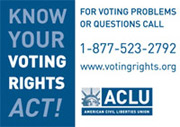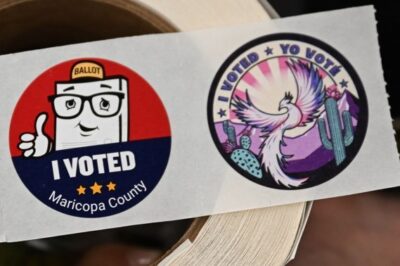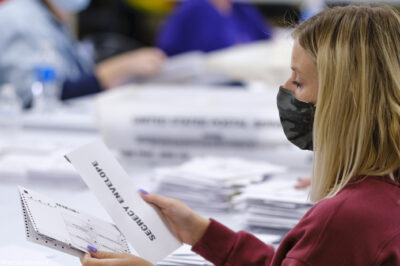
Florida is ground zero for every major voting problem in the country... If it happens in Florida, it's likely a problem in other places - and if it happens somewhere else, it has probably already occurred in the Sunshine State.
Butterfly chads in 2000, voting technology issues in 2004 and 2006, laws and policies that disqualify voters and suppress the vote, felon disfranchisement, registration issues - these are just a few of the hot-button issues that Florida deals with every election year (and in between).
Voter registration is likely to top the list of issues that the state of Florida has not properly addressed prior to the November election. On September 8, Secretary of State Kurt Browning implemented a new "no match" law, which requires a match between the driver's license number, Florida identification number ("Florida ID"), or the last four digits of their Social Security number entered on the voter registration application with a record in the Department of Highway Safety and Motor Vehicles or Social Security Administration databases. A "no match" result could even be due to clerk's data-entry error.
If a voter applicant's information cannot be "matched," the supervisor of elections must notify the applicant by mail that he or she must provide a copy of his or her ID by mail, fax, email, or in person to the supervisor before voting to become properly registered and allowed to vote a regular ballot. If a voter has a Florida driver's license (or a Florida non-driver ID card), they must provide a copy of the required identification.
If an unmatched applicant has not produced a copy of the relevant ID before Election Day, the applicant will be permitted to vote, but only a provisional ballot, which will not count unless he or she produces a copy of the relevant ID to elections officials by 5:00 p.m. on the Thursday after Election Day.
The ACLU of Florida called on Governor Charlie Crist and Sec. Browning to suspend implementation of the "no match" law until after the election, pending the result of a lawsuit challenging the law.
At minimum, the Secretary of State should issue a directive to Supervisors of Election allowing them to resolve any matching issues at all polling places, and not just at the elections offices. Some Supervisors (Pinellas County's among others) have already said they are willing to do this. This action would demonstrate to voters that Florida is committed to an open and fair election.
Learn more about Florida's "no match" law and take action.
But voter registration is only one component to the voting issues trifecta in Florida.
ACLU efforts in Florida have led to new voting technology, capable of conducting meaningful recounts. After the 2000 election debacle, the 15 most populous counties that contain the majority of registered voters implemented new touchscreen technology in a knee-jerk reaction, which was a desperate and expensive mistake. That move led to the problems we saw in 2004 and 2006, specifically with the contested election in Sarasota's 13th Congressional District. The ACLU sued for a revote, since a meaningful recount was impossible. This year, for the first time, Floridians will vote using optical scan machines, which is the third evolution of voting technology in as many presidential elections.
The chief voting issue in Florida, though, remains felon disfranchisement. In Florida, close to one million individuals convicted of a felony are stripped of their civil rights (including the right to vote), even after completion of their sentences. Loss of civil rights takes away not only the right to vote, but also the right to hold public office and serve on a jury. Further, until civil rights are restored, individuals cannot qualify for certain types of state licenses necessary for many jobs, such as those in the construction and medical fields.
Gov. Crist claimed in April of 2007 that he made refranchisement automatic for hundreds of thousands of ex-offenders in Florida who were convicted of non-violent offenses, but a year and a half later, we can see that the state has not walked the walk. Thousands of refranchised voters may not have even known that they were eligible because the state did not adequately get out the word.
The ACLU, along with the Florida Rights Restoration Coalition, launched a statewide advertising campaign in 2008 to get the word out.
Much work remains to make restoration of civil rights automatic for all Floridians, including removing the precondition that restitution must be paid prior to restoration of civil rights. While restitution should be paid when ordered by a court, the victim is less likely to receive compensation if the ex-offender is impeded from earning a living to accomplish that.
Voting issues abound in Florida: voter registration, large turnout of first-time voters coupled with insufficient numbers of trained pollworkers, new voting technology, and hundreds of thousands of disfranchised voters - just to name a few.
All Floridians deserve a fair and open election. If you need information about your rights at the polls, download our Florida Voter Empowerment Card at: www.aclufl.org/issues/voting_rights/vec.cfm
- Howard Simon, Executive Director, and Muslima Lewis, Director, Racial Justice / Voting Rights Projects, ACLU of Florida



